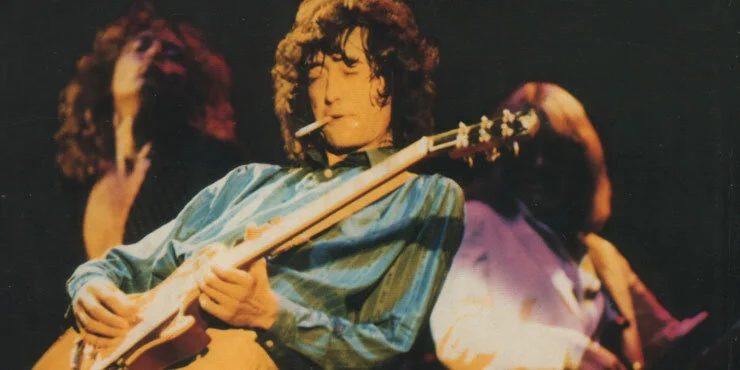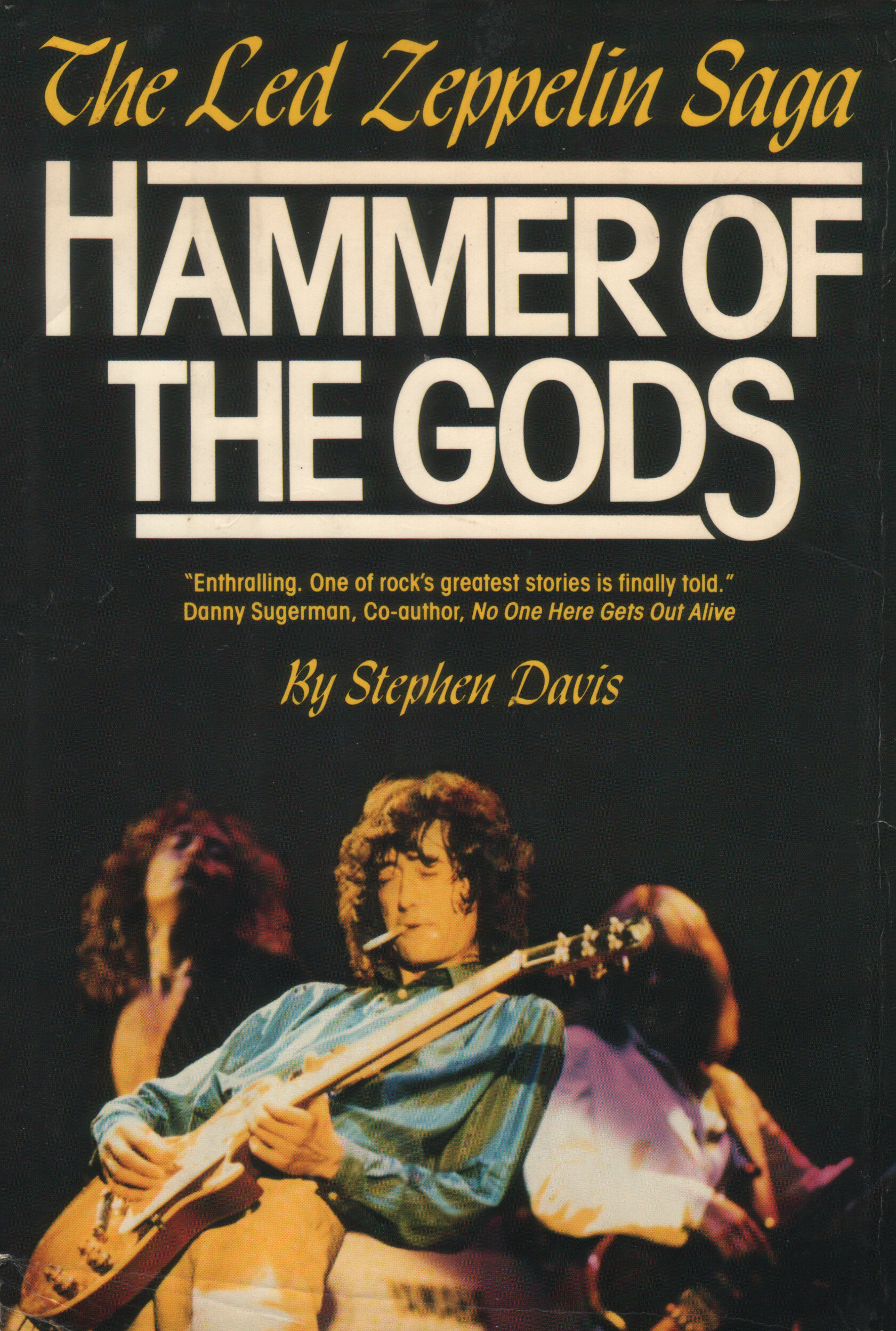Blog.
Jimmy Page Was My Co-Pilot
JULY 26, 2005
In 1985, when I was a sophomore at Bloomington High School South in Bloomington, Indiana, my English teacher gave us one of those assignments that all students dread: an oral report.
I was 16 then, with long, Allman Brothers-style hair and a potentially tinnitus-causing obsession with playing loud rock guitar. Sometimes I’d drive home at lunch, five minutes each way, just to play my guitar at bone-crushing volume for 15 minutes before heading back to my boring classes.
My English teacher’s assignment was an oral report on a book of our choice. I had no trouble selecting a book, because I had just read the definitive work on one of my favorite topics: Led Zeppelin. Stephen Davis’s cheesy Led Zep biography, Hammer of the Gods, had just been published, and I probably read it front to back the day it came out. (I still have my copy, and it’s a first edition!)
To make my report more entertaining—and, possibly, to deflect some of my anxiety about having to speak in front of my classmates, when I might accidentally get, I don’t know, a boner or something—I showed up to school that day with a boombox and a cassette of Led Zeppelin II cued to the first track. When it was my turn to stand before the class, I walked to the front of the room, pressed play on the boombox, and delivered my report to the sounds of “Whole Lotta Love.” I even paused my reading during the guitar solo so everyone could listen to it. Was I a dork? Yes, yes, I was. Did I like to get the Led out? Yes I said yes I did Yes.
My report was a big hit with the class. I still have my hard copy of it, all creased and faded and dog-eared. A couple of times in the last few years I’ve re-created that English-class performance in front of audiences here in New York, complete with the “Whole Lotta Love” accompaniment. The first performance was at one of the great John Hodgman’s Little Gray Book Lectures; the second was at Lindsay Robertson‘s inaugural Ritalin Reading in March 2004.
I’ll post the text of the report after the jump.
The picture below was taken in late 1986, during auditions for my school’s battle of the bands. My group was a power trio, and I was the singer and guitarist. We did three songs at that battle of the bands: “Scuttle Buttin’” and “Lovestruck Baby” by Stevie Ray Vaughan (my hero) and “Red House” by Jimi Hendrix. Guess what: We won the damn thing, and there was actually some decent competition. I have this performance on videotape, and it is fun to watch. Don’t ask me to tell you the name of that band, because I won’t tell you. It’s too embarrassing. Anyway, don’t I look like a ROCK STAR? Check out the Led Zep shirt I’m wearing.
A few friends who’ve seen this picture tell me that my haircut is a mullet, but I have to disagree. The sides aren’t short enough for it to qualify as a mullet. Am I right, people? I am so right. (Here is what I look like now.)
Here’s the report. I’ve left all the grammar and punctuation completely intact. The original document is slugged “Rolling Stone” at the top; I think our exact assignment was to write a book report in the style of our favorite magazine. Was Rolling Stone really my favorite magazine back then? It might have been.
For the full effect, launch iTunes and double-click on “Whole Lotta Love” right before you start reading this.
When author Stephen Davis set out to chronicle the life and times of Led Zeppelin in his new book, THE HAMMER OF THE GODS, he had quite a task ahead of him. Led Zeppelin is considered by many, including this reviewer, to be the best rock group of all time. They set the standards by which all hard-rock groups that followed them would be measured: the excessive drug use, the smashing of hotel rooms, the incredible profits, the numerous and variegated incidents with groupies
“Variegated”? Where did that word come from?
in addition to their ground-breaking blues-based hard rock music. The book chronicles the group’s entire career and beyond, starting in the mid-1960’s when guitarist Jimmy Page was the most sought-after session musician in London to the group’s inception in early 1969 to the group’s demise in 1980 (due to the death of drummer John Bonham) to the surviving individual members’ post-Zeppelin solo activities.
Davis’s main source for quotes, stories and “incidents” seems to have been Led Zeppelin’s raucous road manager, Richard Cole.
My use of quotation marks in this report is very odd. I have no idea what most of them are supposed to indicate. Emphasis? Irony?
Cole often “egged on” the members of the group, especially the oft-inebriated Bonham, to perform many of the famous things that they were famous for, even participating in most of them himself: the demolishing of ENTIRE FLOORS of hotels, the violent “lessons” taught to dishonest concert promoters, groupies and various other hangers-on. Cole “offers” his opinion on most major events that occurred to Led Zeppelin in their lifetime. He was fired from his job because of his excessive drug use, about six months before the group’s unfortunate end. He seems to be very bitter about his days with Zeppelin; this bitterness, coupled with his strange affinity for a certain four-letter word beginning with the letter “F”, combine to give the book a very interesting and original outlook.
The major strength of the book was its “revealing” nature; for example, it was very interesting to find out that two rock “gods”, lead singer Robert Plant and drummer Bonham, were so scared of being away from home during the group’s first few tours that they always slept with the lights on! Davis also did a good job of going behind-the-scenes of the making of each Led Zeppelin album and to find out what inspired a particular song or solo.
The book’s only really detectable weakness was the fact that there weren’t enough quotes from the actual members of the group. Most of the stories told in the book ended with Richard Cole’s opinion of what happened. This was fine, but it would have been much more interesting to hear what the group members felt about it by using actual quotes. Thinking back, this reviewer can not recall even one quote from the habitually silent bass player, John Paul Jones. One is left with absolutely no idea of what Jones’s feelings were.
I was too naive to understand that the surviving members of Led Zep would not have wanted to cooperate with Stephen Davis.
Overall, this reviewer found the book to be very interesting, and many new things were learned. Led Zeppelin’s career was one that can never be duplicated, one that was filled with happiness as well as great personal tragedy. Unfortunately, the “ending” is already known when one picks up the book, and, unlike in fiction, all the “hoping” in the world can’t change that ending. Led Zeppelin was a group that will never be approached in terms of musical ability, flamboyance and pure entertainment value, and HAMMER OF THE GODS is a just epitaph.


